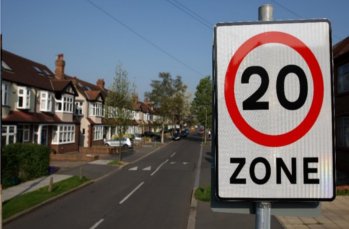A team of the UK’s leading road safety professionals has warned that the ‘rush’ to introduce blanket 20mph limits in towns and cities may be counterproductive.
The new report Save Lives, Slow Down, published for National Road Safety Week (20-26 November), aims to debunks some popular myths and urges evidence-based solutions to save lives and prevent injuries.
The report points out that a 5% reduction in average speed can result in a 30% reduction in the number of fatal traffic crashes, while 59% of all fatalities in Great Britain occur on country roads where limits are typically 60mph.

20mph zones need engineering and signing measures
In the foreword to the report, Adrian Walsh, director of charitable partnership RoadSafe, says: ‘If a 5% reduction in average speed can result in a 30% reduction in the number of fatal traffic crashes, it is hard to think of any other low-cost intervention that could deliver such a potentially huge reduction in human suffering and economic loss globally.
‘However, the challenge for politicians and road safety professionals is to find interventions that are acceptable, affordable and effective. Popular may not always work well; and initially-unpopular schemes can deliver powerful results.’
Richard Owen, director of Road Safety Analysis, urged restraint ‘in the rush to introduce blanket 20mph limits’. He said 20mph zones normally have lower average speeds already and achieve compliance and safety improvements through engineering and signing measures, while signed-only 20mph limits often see poor compliance.
The report recognises resistance to the widespread use of speed humps and cameras in residential streets but acknowledges the effectiveness of average speed cameras strategically placed on higher speed roads.
It includes a case study on the average speed camera scheme on the A9 in Scotland, which has resulted in a 50% reduction in all casualties and a 33% cut in fatalities.
The report is based on a Speed Summit supported by PACTS, the Parliamentary Advisory Council for Transport Safety.
Other facts highlighted in the report:
- 30% of serious crashes are caused by deliberate violations and risk-taking behaviour
- The risk of a pedestrian being killed if hit by the front of a car is estimated to be 1% at an impact speed of 20 mph, 7% at 30 mph and 31% at 40 mph
- Inappropriate or excessive speed are two of the contributory factors most often recorded by police crash data; in-depth studies say that the true level may be three times higher
- The UK has more than 50 stretches of road permanently covered by average speed cameras, amounting to 255 miles under observation
Register now for full access
Register just once to get unrestricted, real-time coverage of the issues and challenges facing UK transport and highways engineers.
Full website content includes the latest news, exclusive commentary from leading industry figures and detailed topical analysis of the highways, transportation, environment and place-shaping sectors.
Use the link below to register your details for full, free access.
Already a registered? Login